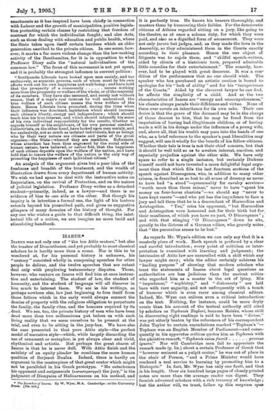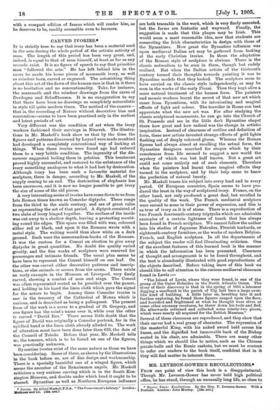Issmus was not only one of "the ten Attic orators,"
but also the teacher of Demosthenes, and yet probably to most classical scholars he is hardly more than a name. Nor is this to be wondered at, for his personal history is unknown, his " oratory " consisted wholly in composing speeches for other people to deliver, and the twelve speeches that are extant deal onlir with perplexing testamentary disputes. Those, however, who venture on Isa.eus will find him at once instruc- tive and entertaining. The student of law, the student of humanity, and the student of language will all discover in him much to interest them. We see in his writings, as perhaps nowhere else, law just beginning to free itself from those fetters which in the early world always connect the demise of property with the religious obligation to perpetuate the family, the family rites, and the honours required by its dead. We see, too, the private history of men who have been dead more than two millenniums put before us with such living reality that we seem ourselves to be present at the trial, and even to be sitting in the jury-box. We have also the cue presented in that pure Attic style—the perfect model of narrative style—which, while largely discarding the use of ornament or metaphor, is yet always clear and vivid, rhythmical and artistic. But perhaps the great charm of Isaeus is that he is never dull. With Attie finish and the subtlety of an equity pleader he combines the more human qualities of Serjeant Buzfuz. Indeed, there is hardly an argument in the masterpiece of that great orator which might not be paralleled in his Greek prototype. "He• outschemes his opponent and outgenerals (scaraorparriya) the jury," is the 3udgment of Dionysins of Halicarnassus on his method, and • The Speeches of Isaacs. By W. Wyse, MA. Cambridge : at the University Press. [18s. net.] it is perfectly true. He knows his hearers thoroughly, and masters them by humouring their foibles. For the democratic citizens of Athens regarded sitting on a jury, like going to the theatre, as at once a solemn duty, for which they were paid, and also as a dignified form of amusement. They were not only jurors but judges, and, as they made the laws in the Assembly, so they administered them in the Courts exactly according to their pleasure. Hence the one object of litigants was to cajole them, and "skilful speech-writers, aided by clients of a histrionic turn, prepared admirable little comedies for their entertainment." The comedy, how- ever, had to be played with great decorum. It was a con- dition of the performance that no one should wink. The speaker who has purchased an artistic oration is bound to apologise for his "lack of ability" and for his "inexperience of the Courts." Aided by the cleverest lawyer he can find, he affects the simplicity of a child. And as the two characteristics of Isamu are "energy and unscrupulousness," his clients always parade their diffidence and virtue. None of them ever covets an inheritance for its own sake. Their one desire is that the grave of the deceased may be in the charge of those dearest to him, that he may be freed from the imputation of having had illegitimate children, or of having made a will in his dotage under the influence of a young wife, and, above all, that his wealth may pass into the hands of one who, as a brief reference to the speaker's past liberalities may suggest, will use it wholly for the benefit of his fellow-citizens. Whether their tale is true is not their chief concern, but that it should be well told so as to awaken interest, emotion, and especially prejudice' against the other side. We have only space to refer to a single instance, but certainly Dickens himself could not have invented a more delightful legal argu- ment than that which fills the last fourteen sections of the speech against Dicaeogenes, who, in addition to many other crimes, is described as so lost to all sense of decency as never• to have had "a steed "—presumably for cavalry service— "worth more than three mina,e," never to have "spent his money on four-horse chariots "—we should say "never to have kept racers "—and who yet has the impudence to face a jury and tell them that be is a descendant of Harmodius and Aristogeiton. "Yes," cries his opponent, "but Harmodius and Aristogeiton were honoured not for their birth but for; their manliness, of which you have no part, 0 Dicaeogenes " ; and with that stinging "0 Dicaeogenes " down he sits, greatly to the distress of a German editor, who gravely notes that "the peroration seems to be lost."
As regards Mr. Wyse's edition we can only say that it is a masterly piece of work. Each speech is prefaced by a clear and careful introduction ; every point of criticism or inter- pretation is examined with learning and judgment ; the• intricacies of Attic law are unravelled with a skill which any lawyer might envy; while the editor certainly achieves his "leading purpose" of showing that modern scholars who treat the statements of Isa.eus about legal questions as authoritative are less judicious than the ancient critics. who regarded him as a master in the art of lying. His "impudence," "sophistry," and " dishonesty " are laid bare with rare sagacity, and not unfrequently with a touch of humour which is even rarer among classical editors. Indeed, Mr. Wyse can enliven even a critical introduction, on the text. Nothing, for instance, could be more dryly comic than his account of the textual authority still cited by scholars as Tophanis Taylori, because Reiske, whose skill• in discovering right readings is said to have been "divine," was yet utterly beaten by the references of his correspondent. John Taylor to certain emendations marked " Topham's "— Topham was an English Member of Parliament—and cense.' quently in his apparatus criticus quotes him as Tophanis with the plaintive remark, " Topiranis cities fuerit 1YrOrSUS ignore." Nor will Cambridge men fail to appreciate the remark made (p. lix.) about a certain Professor of Greek that "however eminent as a pulpit orator," he was out of place in the chair of Porson, "and a Prime Minister would have rendered a real service to learning by promoting •him to a Bishopric." In fact, Mr. Wyse has only one fault, and that -is his length. Over six hundred large pages of closely printed notes are more than the average reader can digest. They. furnish advanced scholars with a rich treasury of knowledge ; but the author will, we trust, follow up this magnum opus
with a compact edition of Isaeus which will render him, as he deserves to be, readily accessible even to learners.











































 Previous page
Previous page